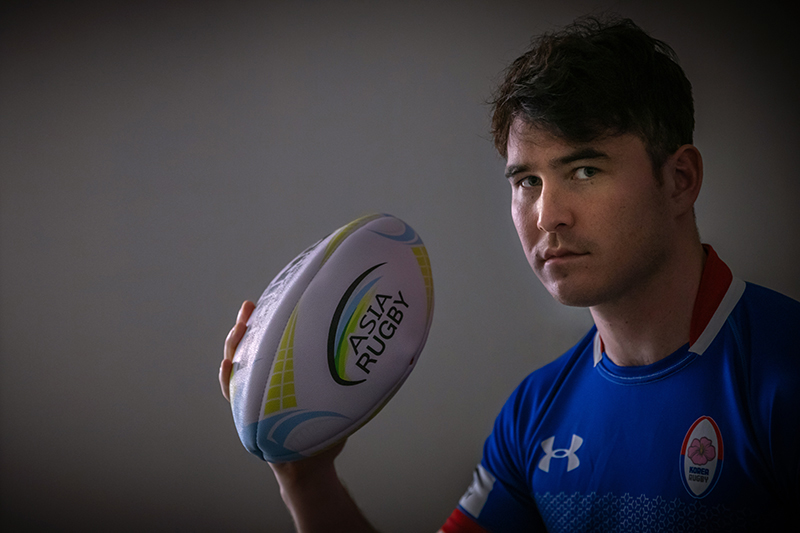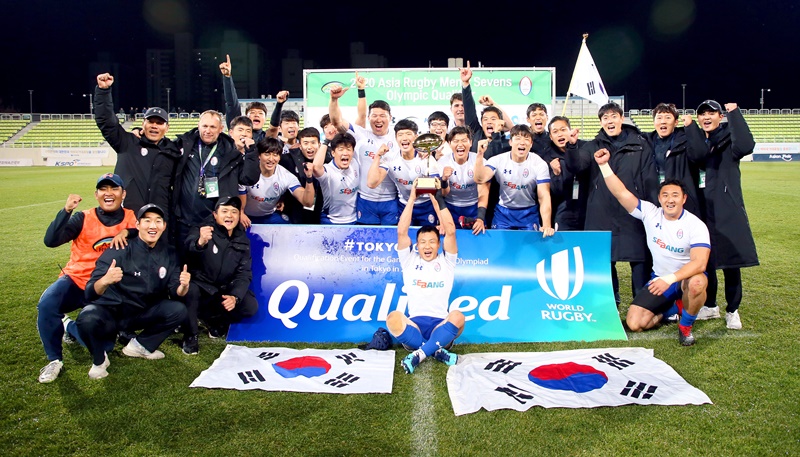
Korean rugby player Kim Jin told Korea.net in an interview what he hopes to accomplish in the Summer Olympics. (Kim Sunjoo)
By Lee Jihae
July 27 this year would have been a significant day in Korean rugby history had the Tokyo Summer Olympics not been postponed due to COVID-19.
The Korean national team would have competed for the first time in the Olympics. Rugby was removed as an official event for 92 years after the 1924 Paris Olympics, but returned for the 2016 edition in Rio de Janeiro, Brazil.
On Nov. 24 last year, the national team earned a berth in the Tokyo Olympics at an Asian qualifier in Incheon by defeating Hong Kong, 12-7. The achievement was remarkable considering that Korea has fewer than 1,000 registered rugby players.
Kim Jin is one of the national squad's 12 players and the team's first naturalized member. His English name is Andre Jin Coquillard, and he was born in 1991 to an American father and a Korean mother.
Kim played for the U.S. under-17 national team in high school and played for his school while attending University of California-Berkeley. After graduating from college in 2014, he started working at a sports management company in Shanghai. At the time, the U.S. had no pro rugby league.
In Shanghai, Kim continued to play rugby as a hobby and attracted the attention of the Hong Kong rugby team in 2015. The squad offered him a roster spot and discussed the potential for him to receive residency in the city-state to play for Hong Kong internationally.
Kim declined the offer and instead contacted the Korea Rugby Union. The following year, he left his job in Shanghai to join the Korean national team, and in 2017, he became a Korean citizen.
Korea.net held an interview in Seoul with Kim in February on why he joined the Korean national team and his plans and goals for rugby in the country, and held follow-up questions recently via phone and e-mail for more updates.
Why did you decline joining the Hong Kong team and instead contact the Korea Rugby Union?
It was because of the attachment I have for my mother's country. I've spent most of my life abroad, but I was born in Korea and have spent every summer vacation in Seoul with my mother. People often consider me a foreigner because of my appearance, but I've always considered myself Korean. My middle name Jin is my Korean name that reflects my Korean identity. So I chose to naturalize as a Korean.
Were you afraid of an uncertain future after leaving your stable job to join Team Korea?
I've dreamed of becoming a professional rugby player since my teenage years, so I was willing to take the risk. I didn't blindly and unconditionally pursue that dream, though. I set a timeline for myself. In case I couldn't make a living as a rugby player, I was planning to live off my savings for two years. I was more worried about cultural barriers than financial uncertainty.
How did you overcome cultural differences?
I absorbed Korean culture quickly like a sponge as I spent time with my Korean rugby teammates. They taught me so much about Korean culture, and I shared with them my training experiences and know-how gained from abroad. Now we're close enough to call each other by nicknames.
How is Korean rugby compared to that of other countries?
Korea has very few players. England, one of the four constituent countries of the U.K., has 600,000 registered players and Japan more than 100,000. Even Guam, with a population 0.34% of Korea's, has more rugby players than Korea. And Korea doesn't have a set rugby season.

The Korean national rugby team on Nov. 24, 2019, rejoices after defeating Hong Kong, 12-7, at an Olympic qualifier in Incheon to earn a berth in the 2020 Tokyo Summer Olympics. (Korea Rugby Union)
How did you feel when the nation team secured an Olympic berth in November last year?
As soon as our spot in the Olympics was secured, my teammates and I hugged each other and cried for joy. If we didn't advance to the Olympics, that Asian qualifier would've been my very last game. My father was starting to pressure me to resume working at an office since I'd tried rugby. After that game, I called him to say I'd do rugby for one more year to play in the Olympics. I saw my mother and my aunt in the stands and pumped my fist. She was crying, and seeing her cry made me cry harder. The whole process of naturalization was quite complicated and stressful, and she gave me immense support. I sometimes jokingly call her my "mom-ager."
How have you been since leaving Jincheon National Training Center in late March due to COVID-19?
I'm back in Seoul doing individual workouts while attending a physical therapy center a few times a week. Other players have returned to their respective corporate teams or homes. We can't go back to the Athletes' Village until we get notification from the Korea Rugby Union and the Korean Sport and Olympic Committee.
How do you maintain your skills while being unable to play?
I play in two scrimmages with corporate teams each week. It's not the same as playing in a real game, but we're doing our best.
How did you feel after hearing that the Olympics got postponed?
I was really disappointed. It's every athlete's dream to represent one's country. It was further disappointing because we Korean players bear the responsibility of growing the game of rugby in Korea, which remains unpopular in the country. But given the severity of the COVID-19 situation, we're fully aware that postponing the Olympics was both the right and only decision.
What do you dream of achieving in next year's Olympics?
I hope more Koreans grow interested in rugby. Rugby requires muscular strength and speed, as players constantly run into and hit each other. It also requires strategy. I hope rugby becomes a sport beloved by more Koreans. I want to show Korean rugby's potential through the Olympics.